The United States is implicated in the Philippines’ violent drug war, revamped by in 2016 by President Rodrigo Duterte and denounced by human rights activists the world over. And the country’s contributions are not limited to President Donald Trump’s endorsements.
From fiscal years 2014 to 2018, federal entities committed at least $14 million to support law enforcement in the Philippines, much of which involved prosecuting and adjudicating the surge in drug cases. The awards, administered by the Department of State’s Bureau of International Narcotics and Law Enforcement Affairs (INL) and the US Agency for International Development (USAID), were intended to strengthen the “rule of law” by optimizing the functioning of criminal courts packed with drug cases, by far the most common category. In 2017, these topped 70,000 cases, compared with 20,000 relating to bounced checks—the second largest category.
The Judicial Strengthening to Improve Court Effectiveness Project, funded by USAID and co-implemented by the American Bar Association, supported the development of the Philippines’ revised criminal procedure guidelines published in 2017, which were intended, in part, to decongest courts bottlenecked by drug cases opened by Duterte’s anti-drug campaign.
In the revised guidelines, a special timespan for drug case adjudication was established: 75 days, from the start of trial to submission for resolution. In the first 10 months of their implementation, from September 2017 to June 2018, a far lower proportion of drug cases (7 percent) were tried by the required date thanof all criminal cases (47 percent), according to The Manila Bulletin. The disparity was still an improvement: Before the revisions, only 0.02 percent of drug case trials met the then-prescribed deadline.
A Philippines Supreme Court Justice attributed what he called the “successful” outcome to the US-American partners.
In the year between mid-2018 and mid-2019, the pace of drug adjudications seemed to improve. According to Rappler, 40 percent of cases filed after the 2017 guidelines met the 75-day deadline. Yet, none of the cases filed prior to then did.
The backlog in drug-war cases has likely contributed to the Philippines’ status as the country with the second most overcrowded carceral facilities. Three-quarters of those incarcerated are pre-trial detainees, according to World Prison Brief.
A different US-backed project that pre-dated Duterte’s assault on drug users and sellers was riddled with incompetency. Backed by INL, the million-dollar Justice Sector Reform Project “lacked focus and effectiveness,” a November 9 watchdog report by the Government Accountability Office (GAO) summarized from a 2016 evaluation, and was recommended for funding discontinuation. It had been “nearly impossible to oversee progress or to determine […] if or to what degree the implementing agencies were achieving desired results, or what challenges they were facing,” the report found.
Despite helping to facilitate drug-war adjudication, INL noted that the extrajudicial elements of the war, like killings by unidentified gunmen, may have invalidated its own participation. INL found that the 2016 evaluation may have been “hampered” by the drug war’s extrajudicial killings, affecting “the evaluators’ approach to programmatic review and hampered management’s decisions on which evaluation recommendations to pursue.”
The same agency behind the failed Philippines Justice Sector Reform Project seems to have a track record of bungling its overseas funding related to drug wars around the world. Earlier this year, GAO found that INL was missing or possessing inadequate data from a funded study surveying Mexican civil society’s perception of the country’s law enforcement.
Photograph of the old Philippines Supreme Court Building by Ramon F Velasquez via Wikimedia Commons/Creative Commons





Show Comments